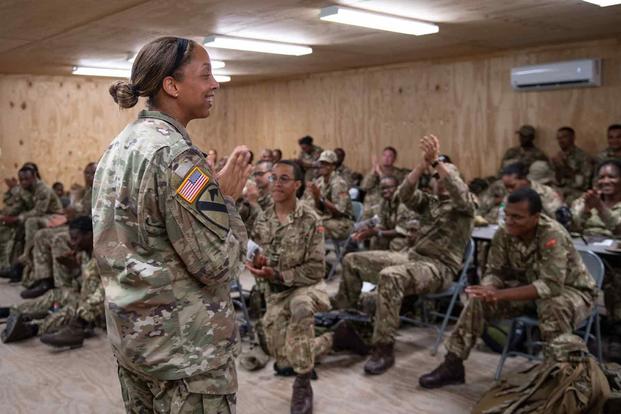Women serving in tactical peacekeeping and security operations often work better with the civilian populations they're charged with protecting because of cultural norms, according to a report released this month.
The report pointed to several areas where having women involved in decision-making and mission execution yielded better results, according to the authors. Those included preventing violence.
"It's really to help commanders, the people making decisions, understand how gender factors might come into play and may impact operations," said co-author of the report Joslyn Fleming, a researcher at the think tank Rand Corp.
Read Next: Navy SEALs Start Performance-Enhancing Drug Tests Next Month. Legal Challenges Are Likely to Follow.
That includes situations where local women may not be able to speak freely to men or when men are around, a common occurrence during U.S. operations in Iraq and Afghanistan.
Beyond making missions more effective, purposefully empowering women could serve as a boon to U.S. forces as they continue to look for partners in competing against China and Russia.
"By ensuring organizations distribute aid more equitably, the United States gains a strategic advantage over such countries as China that often ignore on-the-ground barriers to the equitable allocation of aid," the report read.
The study's debut coincides with the six-year anniversary of the 2017 Women, Peace, and Security Act, which directed the Defense Department and State Department to work toward boosting women's involvement in conflict resolution.
The report also noted the importance of soliciting advice from and listening to local women during disaster relief missions, when access to information and resources is key. In some countries, women don't regularly attend large, majority-male gatherings.
But according to the report, if women can both routinely receive and provide information, "DoD operations will go more smoothly, with fewer failures on the ground."
For years, much of the focus on U.S. service women's expanding roles in the military has been on them passing arduous infantry courses, or on groups like female engagement teams, who worked within infantry units to engage with local women in the Middle East.
But Fleming noted her group focused on more subtle areas where U.S. gender advisers, troops who have received training to ensure that gender and sociocultural considerations are accounted for in military operations, are working to engage locals.
She highlighted one anecdote about U.S. military gender advisers working in Guyana in 2021, during U.S. Southern Command's annual Tradewinds exercise.
Gender advisers were able to determine that female Guyanese soldiers weren't able to assist in the nation's border security operations, including counter-human trafficking efforts, because of a shortage of women's barracks and restrooms. U.S. advisers in turn were able to help support construction of a women's dormitory.
"It's really helpful when you think of things like human trafficking and drug smuggling," Fleming said. "By having broader perspectives, people are able to better identify risk factors, and they're able to do better assessments of people that help with those operations."
On another occasion, gender advisers involved in Operation Allies Welcome were faced with an especially sensitive challenge when a number of Afghan refugees were identified as victims of domestic violence within their temporary U.S. camps.
The victims, mostly women and children, couldn't escape since their access to the U.S. was tied to their abuser, usually a male relative who was the primary visa-holder.
Defense Department gender advisers coordinated with the State Department and the Department of Homeland Security to establish a "protection advisory group" to prevent and respond to the violence.
Fleming added that, while the Rand report focuses primarily on gender-focused initiatives abroad, it's not hard to notice the impact on the U.S. military itself. The report acknowledged the probability of backlash as part of women's inclusion, but Fleming says it's just one more part of changing the internal culture of the military.
"It's important to realize how these types of stories and overarching research can really demonstrate the meaningful impact that women and our perspectives bring to the military operations."
Related: The Marines Are Moving Gradually and Sometimes Reluctantly to Integrate Women and Men in Boot Camp













